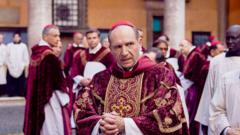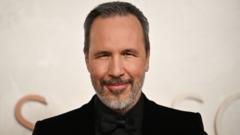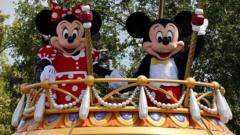In the latest cinematic sensation "Conclave," viewers are drawn into the complex and hidden world of the Vatican, showcasing the intricate process of selecting the leader of the Roman Catholic Church. As the real-life election of Pope Francis’ successor approaches on May 7, 2024, the film serves as both a dramatic portrayal and an introduction to the tension-filled atmosphere surrounding this sacred event.
Based on Robert Harris's bestselling novel, "Conclave" puts a spotlight on the 134 cardinal-electors who find themselves isolated within the Sistine Chapel, engaging in deep discussions and strategic planning, entirely cut off from the external world. This isolation, a tradition aimed at minimizing outside influences, starkly contrasts with today’s calls for transparency in decision-making.
Experts highlight the film's ability to capture not only the intense responsibility felt by the cardinals but also the political dynamics at play. "It’s essentially about the political machinations that go on," remarked Nick Emerson, the film's editor, adding that while divine guidance is paramount, the pressure to reach a consensus can lead to intense politicking.
As depicted in the film, the tension before the official voting commences is palpable, with cardinals forming factions and vying for influence—a reflection of what is likely to occur behind the scenes during the actual conclave. According to Tina Beattie from the University of Roehampton, the intrigue may commence even before the doors close, with cardinals striving to align their visions as they prepare to elect a new pope.
One captivating aspect of "Conclave" is the introduction of a previously unknown cardinal thrust into the election process. While this plot twist adds drama, it diverges from reality where all cardinal voters must have been publicly appointed. Nonetheless, the upcoming election may be historically unpredictable, given that a majority of cardinals were appointed by Pope Francis himself, representing a fresh perspective and diverse backgrounds reflective of the global Church.
The director of "Conclave," Edward Berger, emphasizes the human nuances of the cardinals, presenting them as relatable figures confronting personal struggles amid their sacred duty. This portrayal of the conclave reveals the humanity behind the ritual, blending spiritual purpose with touchpoints of ambition, fear, and vulnerability, thus making the narrative not just about the election of a pope, but about the shared human experience.
As the date approaches, "Conclave" not only entertains but also enlightens—offering a deeper understanding of the responsibilities that lie ahead for the men tasked with such pivotal decisions, framed within a richly complex narrative that resonates with viewers beyond the Church.
Based on Robert Harris's bestselling novel, "Conclave" puts a spotlight on the 134 cardinal-electors who find themselves isolated within the Sistine Chapel, engaging in deep discussions and strategic planning, entirely cut off from the external world. This isolation, a tradition aimed at minimizing outside influences, starkly contrasts with today’s calls for transparency in decision-making.
Experts highlight the film's ability to capture not only the intense responsibility felt by the cardinals but also the political dynamics at play. "It’s essentially about the political machinations that go on," remarked Nick Emerson, the film's editor, adding that while divine guidance is paramount, the pressure to reach a consensus can lead to intense politicking.
As depicted in the film, the tension before the official voting commences is palpable, with cardinals forming factions and vying for influence—a reflection of what is likely to occur behind the scenes during the actual conclave. According to Tina Beattie from the University of Roehampton, the intrigue may commence even before the doors close, with cardinals striving to align their visions as they prepare to elect a new pope.
One captivating aspect of "Conclave" is the introduction of a previously unknown cardinal thrust into the election process. While this plot twist adds drama, it diverges from reality where all cardinal voters must have been publicly appointed. Nonetheless, the upcoming election may be historically unpredictable, given that a majority of cardinals were appointed by Pope Francis himself, representing a fresh perspective and diverse backgrounds reflective of the global Church.
The director of "Conclave," Edward Berger, emphasizes the human nuances of the cardinals, presenting them as relatable figures confronting personal struggles amid their sacred duty. This portrayal of the conclave reveals the humanity behind the ritual, blending spiritual purpose with touchpoints of ambition, fear, and vulnerability, thus making the narrative not just about the election of a pope, but about the shared human experience.
As the date approaches, "Conclave" not only entertains but also enlightens—offering a deeper understanding of the responsibilities that lie ahead for the men tasked with such pivotal decisions, framed within a richly complex narrative that resonates with viewers beyond the Church.




















